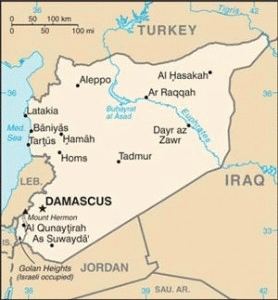Reprinted from Consortium News
The Saudi-Israeli alliance, in league with other hard-line Sunni countries, is helping Al-Qaeda affiliates advance toward gaining either victory or at least safe havens in Syria and Yemen, highlighting unresolved contradictions in President Barack Obama's policies in the Middle East.
Fueled by a surge of support from Saudi Arabia, Qatar and Turkey -- and with Israel striking at Syrian government allies -- Al-Qaeda's Nusra Front and Al-Qaeda's hyper-brutal spinoff, the Islamic State, are making major advances in Syria with some analysts now predicting the likely collapse of the relatively secular government of President Bashar al-Assad.
Saudi Arabia and Israel have made clear over the past few years that they regard the overthrow of the Iranian-backed Assad government as a geopolitical priority even if it results in a victory by Al-Qaeda or the Islamic State. But Obama, who has been unwilling or unable to rein in the Saudi-Israeli alliance, would then have to decide what to do with Islamic terrorists dominating a major Mideast nation.
Some of these Sunni radicals have shown that they will move aggressively toward slaughtering minority groups that they consider infidels, including Christians, Alawites and Shiites. The terrorists could leave the streets of major Syrian cities running red with blood -- and give Al-Qaeda a solid platform from which to launch terrorist attacks against the West.
How Obama or his successor might respond to that is uncertain but it would be difficult for any American president to sit back and do nothing. Yet, dispatching another U.S. military expeditionary force to Syria to dislodge Al-Qaeda or the Islamic State from Damascus and across Syria would likely be a fool's errand resulting in massive loss of life, costing trillions of dollars and promising little success.
Meanwhile, the neocon-dominated mainstream U.S. news media is already pushing the narrative that Obama's failure was that he didn't intervene earlier to overthrow the Assad regime so some "moderate" rebels could have taken power.
But the existence of a significant "moderate" rebel army was always a fiction. As Obama noted in a frank interview with New York Times columnist Thomas L. Friedman in August 2014, the notion that arming the rebels would have made a difference has "always been a fantasy."
Obama explained: "This idea that we could provide some light arms or even more sophisticated arms to what was essentially an opposition made up of former doctors, farmers, pharmacists and so forth, and that they were going to be able to battle not only a well-armed state but also a well-armed state backed by Russia, backed by Iran, a battle-hardened Hezbollah, that was never in the cards."
Obama added that his administration had trouble finding, training and arming enough secular Syrian rebels to make a difference: "There's not as much capacity as you would hope."
Indeed, much of the U.S.-backed Free Syrian Army threw in its lot -- and their U.S.-supplied weapons -- with Al-Qaeda's Nusra Front or the Islamic State in 2013. After that, Obama's only realistic choice was to strike a pragmatic political agreement with Assad and cooperate with Iran and Russia in reclaiming territory from Al-Qaeda and the Islamic State.
Getting Rid of Assad
But that option proved politically impossible because the Israel Lobby and American neocons continued to press for Assad's overthrow. They were aided by Obama's unwillingness to release U.S. intelligence that undercut some of the major anti-Assad themes dominating the mainstream U.S. media. For instance, Obama could have revealed doubts within the U.S. intelligence community that Assad's regime was responsible for the infamous sarin gas attack outside Damascus on Aug. 21, 2013.
Blaming Assad for the sarin attack, which killed hundreds of civilians, was a valuable part of the neocon narrative that prevented any detente with Assad. Yet, even as more evidence emerged that the attack was likely a provocation committed by rebel extremists, Obama balked at updating the initial rush to judgment -- nine days after the event -- fingering Assad's forces.
As recently as this month, the Obama administration was still handing out those initial accusations to CBS' "60 Minutes" and other mainstream media outlets, which simply regurgitate the outdated intelligence data rather than examine the newer evidence that points to a rebel "false-flag" operation designed to draw the U.S. military into the Syrian civil war on the rebel side. [See Consortiumnews.com's "A Fact-Resistant 'Group Think' on Syria."]
Though Obama pulled back in 2013 from bombing the Syrian military, which could have opened the gates of Damascus to Al-Qaeda and/or the Islamic State, the President hasn't been willing to override the "regime change" desires of his State Department, which remains influenced by neocons and their sidekicks, the liberal interventionists.
(Note: You can view every article as one long page if you sign up as an Advocate Member, or higher).






